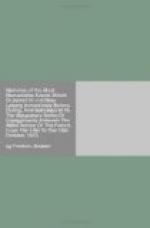As there was no appearance of gleaning much information abroad, I now sought a wider prospect upon a steeple.—So much I had ascertained from all accounts, that it was principally the Austrians who had been engaged the preceding day. Some hundreds of prisoners had been brought in; the church-yard had been allotted to these poor fellows for their abode, probably that they might study the inscriptions on the grave-stones, and thus be reminded of their mortality. Nothing was given them to eat, lest they should be disturbed in these meditations. So far as the telescope would command were to be seen double and triple lines, the end of which the eye sought in vain. The French army stretched in a vast semicircle from Paunsdorf to Probstheide, and was lost in the woods of Konnewitz. It occupied therefore a space of more than one German mile (five English miles). Behind all these lines appeared reserves, who were posted nearer to the city. On this side the main force seemed to be assembled. Towards the north and west the ranks were more broken and detached. Of the armies of the allies, only some divisions could yet be discerned. The Cossacks were plainly distinguished at a distance of two leagues. They had the boldness to venture within musket-shot of the French lines, alight, thrust their pikes into the ground, and let their horses run about. The king of Saxony himself witnessed their audacity whilst in the midst of the French army, about half a league from Leipzig. A number of these men came unawares upon him; and a Saxon officer, with eighty horse, was obliged to face about against them, till the king had reached a place of safety. This was the principal reason why he made his entry into the city on horseback.




